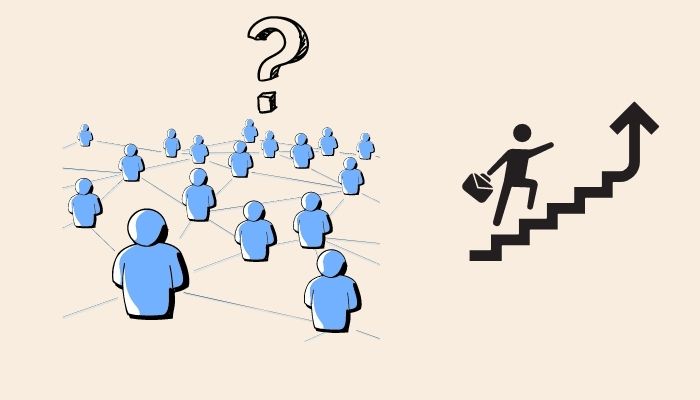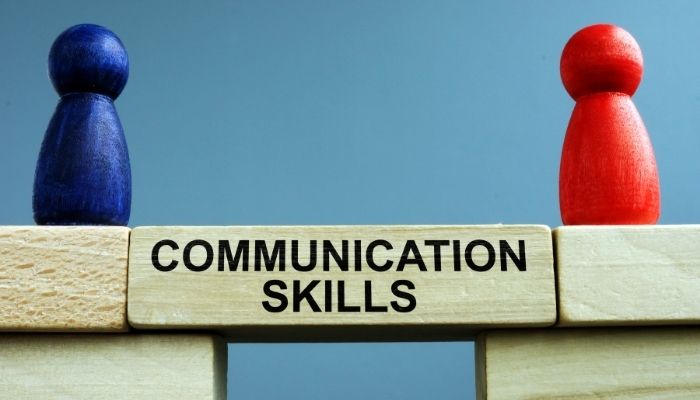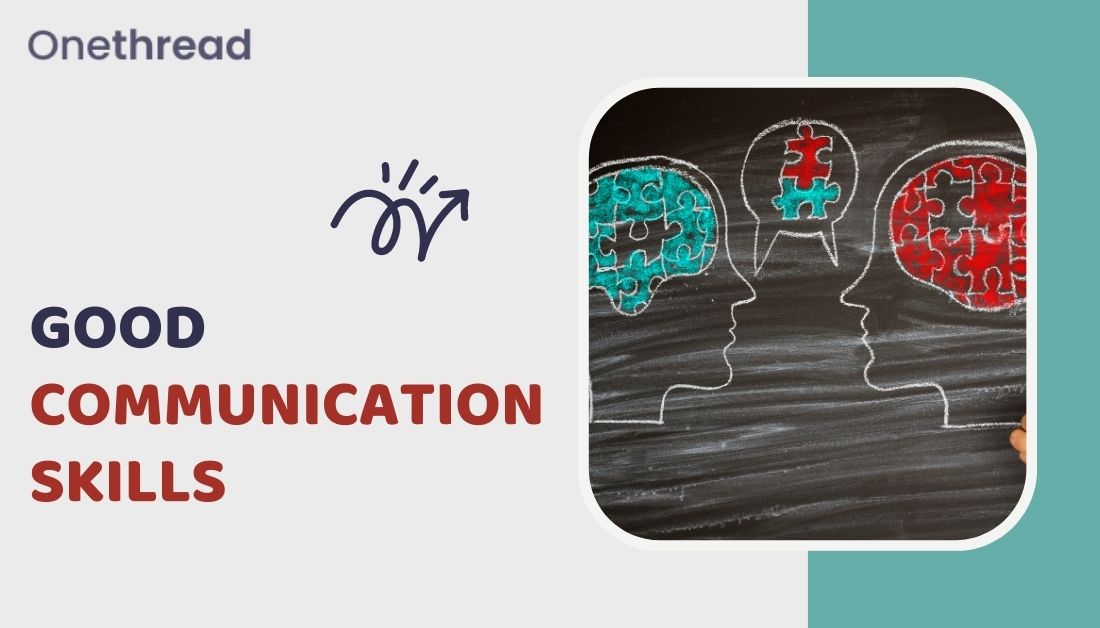Communication is a fundamental aspect of human interaction. It’s the glue that keeps everything together. In the workplace, great communication skills can open doors for career advancement and allow you to advance in your career.
Have you ever been frustrated because your boss didn’t understand what you said? Don’t worry! That’s why I want to talk about some ways of good communication skills. Believe me, these simple tips will positively affect you in every aspect of your life.
But what exactly are good communication skills? Good communication skills are the ability to express oneself clearly, listen actively, and empathize with others are essential components of effective communication skills. So, if you’re ready to take your communication skills to the next level, let’s get started!
Why Are Communication Skills Important for Career Growth?

Communication skills matter the most when you must deliver a message effectively and on time. Good communication helps you understand and respond to complex situations and make critical business decisions quickly. If you want to succeed and get ahead in your career, you need to master the art of effective communication. Here are a few reasons why communication skills are important for career growth:
- Enhances Your Personal Brand
You need to develop strong communication skills to stand out from the crowd and gain recognition in your organization. Good communication skills can help you create a positive brand image for yourself. If people view you as articulate and well-informed, they will develop trust in your ability to get the job done.
- Helps You Network Effectively
Networking is one of the most important activities in the business world today. Strong communication skills are critical for success if you want to build an impressive professional network. To network effectively and create meaningful relationships, you need to be able to connect with people. Your ability to listen and understand the needs of others will help you win the trust of your colleagues, team members, and clients.
- Helps You Launch a Successful Career
Your first job out of college doesn’t necessarily have to determine your career path. In today’s fast-paced business world, where organizations continuously search for smart and talented staff members, you may select the field that suits your personality best. If you want to launch a successful career in an area that interests you most, you must develop strong communication skills.
- Helps You Build Client Relationships
Building and nurturing client relationships is one of the most important skills you can develop as an employee or business owner. Clients want specialists that can understand their concerns, solve their business problems, and help them reach their goals. If you’re a good communicator, clients will trust your opinion while making smart business decisions. To build effective client relationships, you must master the art of effective communication.
Top 10+ Good Communication Skills That Will Help Your Success
Good communication skills are a prerequisite for effective leadership and career growth. So, let’s look at some of the most effective communication skills that will help you overcome workplace challenges, build a positive brand image, and achieve desired outcomes. Here are some of the strongest communication skills that can help you succeed in your career-

- Good Listening Skills
A good listener is one of the most important qualities that successful people share. Good listening skills can make a huge difference between failure and success. In fact, an inability to listen effectively can lead to a domino effect of consequences.
Listening carefully to your coworkers can help you build the listening skills to serve you well in any profession. You should pay attention to what they are saying and what they mean by their words.
A leader’s inability to listen attentively and process information before deciding indicates their lack of leadership qualities. Good listening skills help you understand what others are saying, convey messages clearly and concisely, and listen for cues about how others feel about the message.
- Assertiveness
You are assertive means effectively expressing your thoughts and feelings without hurting others in any way. When you are assertive, it shows that you respect yourself and your boundaries and at the same time, you respect the boundaries of others.
Moreover, being assertive shows that you are independent and can accept that no one is perfect and we all make mistakes. But at the same time, it shows that you are open to learning from your mistakes. Assertiveness does not mean you must express your thoughts and feelings rudely or disrespectfully, nor does it imply rudeness.
An assertive person can be polite without being a pushover. Whether you are an employee or a business owner, being assertive is one of the most effective communication skills you need to learn to handle stressful situations.
- Tone and Volume
How you say, something can be just as important as the content of your message. While it is important that you approach the conversation with a positive attitude and the right tone, it is also important to consider how loud or soft your voice is.
When speaking with someone, ask yourself: “Is my tone respectful, and does it communicate confidence? Am I speaking loudly enough so that others can hear me? Is my body language saying what I want?”
A loud or unclear message could create confusion and lead to missed opportunities. So, it is always better to speak with a soft voice. Having a positive attitude will help you come across as confident and your credibility will increase.
- Body Language
Your attitude, voice and body language can communicate whether you are open-minded or closed-minded. Someone open-minded will show interest in and respect for different ideas and perspectives. It can lead people to understand each other’s ideas better and help them grow as a team.
Body language can also indicate your interest in others and help you build trust. When you smile at your coworker, it shows that you are approachable and friendly. Gestures and facial expressions can be a great way to gain someone’s attention and make a positive impression. So, take a step back, look at yourself with the eyes of an outsider and observe your body language.
- Eye Contact
Eye contact is also important in every conversation. It shows that you are interested in what your coworker has to say, paying attention to them, and are genuinely interested in their message. If a person looks away when speaking with someone, it may show that they don’t care about what the other person is saying.
Poor eye contact can confuse the listeners and make their message sound as if it needs to be more relevant and well-received. But eye contact also shows your interest in others and allows them to see whether or not you understand their message. So, when you are conversing with someone, ensure you maintain eye contact and give the impression that you are engaged in the conversation.
- Time Management Skills
In today’s fast-paced world, you can’t afford to spend more time than necessary on tasks that don’t bring you closer to your goals. Managing your time means prioritizing what is important and will help you learn how to set limits with your commitments.
When you are at work, staying focused and concentrating on one task at a time is important. With all the distractions present in the workplace, it is easy to get distracted and waste your time. Having good time management skills helps you identify your goals and focus on your priorities. You will also be able to make better use of your time, achieve desired results faster and become more productive.
If you are an employee, good time management skills show that you are disciplined and can meet deadlines without compromising on quality. So, you can use Onethread as your project management tool that will increase your productivity. Onethread allows you to keep track of your progress, set deadlines, and communicate with team members all in one place. With its intuitive design and user-friendly interface, you’ll be able to manage your projects effortlessly.
- Storytelling
Storytelling engages employees and builds relationships with consumers and stakeholders. Stories humanize an organization, product or service and make it more approachable. When you have a strong connection with your audience, they will have greater trust in the brand and the people behind it.
Having good storytelling skills can increase your ability to communicate. But don’t just focus on the story; think about how it relates to your audience and their needs. A good story can help you get others’ attention, gain their interest and show them an alternative perspective they may not have considered before.
Using stories in your communication lets you share knowledge effectively and build better relationships. For example, within a customer relationship, the customer can learn about their product or service through storytelling and better understand the company.
- Take Notes
What do you think when you are having a conversation with someone? Most people imagine themselves having a conversation, but what happens when they meet and talk to someone? Do thoughts often go through your head without your realizing? Well, it’s perfectly normal to have an internal conversation, but when you do, you can clearly explain things you could not say aloud.
Your writing plays a big role in communicating with others. It is all part of developing your ability to communicate effectively and efficiently. Writing is an important skill that every professional should have to help others understand their viewpoint.
Good communicators can convey their message in a clear, organized manner through the use of plain language. Write down your thoughts on paper can help you structure your ideas better, especially if you are having trouble explaining something.
Is it hassle to writing everything on paper? Don’t worry! Onethread makes your day easy to keep track of deadlines, assign tasks, and collaborate with your team. So why wait? Sign up for Onethread today and start managing your projects like a pro!
- Wait for the Right Time to Vent
Are there times when you need to vent to someone about what happened at work or in your personal life? If so, you should only do it at the right time. Venting at the wrong time may damage your relationship with your colleagues or jeopardize your job.
When they know that you are upset, they might choose to ignore the situation and try to avoid getting involved in it. However, venting isn’t always a bad thing – venting can help you to realize what you can do to improve yourself or your situation.
Is there anything in your personal life you can work on rather than dwell on what happened at work? If so, solve the problem by changing your lifestyle or taking steps toward resolving the issue.
When you react out of stress, it’s understandable how it can be difficult not to lash out at others because they have contributed to this situation. But you must avoid saying anything that may be rude or hurtful.
- Inclusive Language
People are different and they have diverse backgrounds, cultures, and perspectives. It is important to remember that not everyone will agree with you. There are people out there that may view the world differently than you do. When possible, it’s important to avoid using exclusionary language because it can cause added stress, misunderstanding and conflict within an organization.
Inclusive language is the use of words that ensure everyone has a voice. It encourages people to be more respectful, open and accepting of differences. You can make your language more inclusive by changing exclusive words or phrases, such as “we” for “you”. For example: “We want to improve our quality control process by…” or “What do you think is the most efficient way of handling….”
- Use Humor Effectively
Humor is a valuable tool that can help you connect with others and can be extremely effective during stressful times. Yet it is important to understand that humor is subjective, so you want to make sure that your sense of humor is being used appropriately. Find out how others perceive your sense of humor and see if there are any opportunities to adapt it to your audience.
Ask yourself: is my sense of humor polite and inclusive? Does it create a comfortable environment for all the people involved? Do I offend, hurt, or exclude people with my sense of humor?
While it can be difficult to create the perfect joke, it is not impossible. Humor can help you connect with people and find common ground. In today’s stressful environment, humor may help individuals relax and feel at peace. Asking questions about what they do, who they are and where they live can also contribute to your individual and creative humor.
- Compassion & Empathy
Compassion and Empathy are two of the most prized traits of a leader. Compassion is the ability to put yourself in other people’s shoes and understand what they are going through. You may also have to be compassionate with the people you are communicating with when trying to resolve a situation.
You may also have to be compassionate with the people you are sharing with when trying to resolve a situation. People may have different backgrounds, experiences and attitudes, which makes it important for you to learn about them.
Empathy is the ability to understand the feelings and emotions of others around you. It is an important skill that can help your team bond. Without empathy, it would be impossible to understand what other people are going through or why they may have certain attitudes.
What are the 7Cs of Communication? [ You can make it an infographic]
![What are the 7Cs of Communication? [ You can make it an infographic]](https://www.onethreadapp.com/blog/wp-content/uploads/2023/07/What-are-the-7Cs-of-Communication_-You-can-make-it-an-infographic.jpg)
The 7C’s of Communication is a set of seven skills that, when developed and cultivated, become the basis for effective communication. These are:
- Clear
A clear person communicates with others in a way that they understand the message or the point. When a person says something that is not clear to the receiver of the message, she might not have accomplished what she wanted. Clear communication is one of the most important aspects of communication.
- Concise
Another contributor to successful communication includes communication being concise. Conciseness helps to get to the point most smoothly and efficiently.
- Concrete
A concrete vocabulary is what helps to build solid communication between two people. When one uses concrete words, it helps create a better picture of the message for the receiver.
- Correct
Correctness of facts is one of the key components of successful communication. Facts help create information and knowledge that lead to better understanding between people. Communication is built on facts and should always be honest and correct.
- Coherent
Coherent communication is typically consistent and understandable. Without consistency, there are loopholes and multiple interpretations. A person may say one thing, but the recipient may understand it otherwise.
- Complete
Complete communication has enough information to understand the subject or message. Completion also allows for what is being communicated to be fully understood by all parties and not left out of the conversation.
- Courteous
Finally, courteous communication shows a person’s respect for the person he is communicating with. It also shows the person’s good character. A person who is not courteous in his communication may have more significant issues in other areas of his life.
How Can I Overcome Communication Barriers?
Sometimes, it is impossible to know what other people are thinking or what they’re saying. Because of this, it’s important to be aware of the communication barriers that you may face and be ready to adapt.

Researchers have found that communication barriers are more prominent in today’s workplace because workplaces are becoming diverse. When people come from different cultures, they may have different values, beliefs and opinions. Be aware of these communication hurdles to help your team members overcome these differences:
- Language Barriers
There are many different languages spoken around the world. Sometimes people who speak different languages can have difficulty understanding each other. It is important to remember that when communicating with people from other countries, you need to be flexible and patient.
Sometimes you offend someone because of the language barrier, but it will not make a situation any worse. So long as you understand that it was a mistake, you can move forward and resolve the issue.
- Culture Barriers
Culture plays a critical role in how people communicate. For example, different cultures view privacy differently, and they often use communication styles that differ. Some cultures are more aggressive, while others are more consensus-driven.
A few people communicate directly, while others employ a circuitous technique. You need to understand that being patient and flexible when communicating with people from other countries is important. It will improve connections with employees, customers, and suppliers.
- Psychological Barriers
A psychological barrier exists inside a person’s head, such as problems with self-esteem or anxiety. The important thing to remember is that the problem exists inside the person’s head and has nothing to do with you. Sometimes people put up barriers when they don’t feel uncomfortable discussing specific topics.
When engaging with a person with behavioral problems, remember that what’s going on in their brain has nothing to do with you or your business. Try not to make the issue your business or accuse the person of being unprofessional. It can make the person feel even more uneasy, which may worsen the problem.
- Physical Barrier
Another type of communication barrier is a physical one. It could include fatigue, pain or something else that makes one of the people unable to communicate effectively with the other. When someone has a physical ailment, they should be able to take care of it so they can continue to work properly and produce their best work.
When you work with a person with a physical barrier, it’s important not to make assumptions about their ability to do their job. People are different and have different needs. They should be free to take time off, even if it means working late after their colleagues leave.
Frequently Asked Questions (FAQs)
- Is Communication Critical for Success?
Yes. Communication is critical for success in a variety of ways. When communicating with someone, you send a message representative of everything else about your organization: its values, beliefs and culture. Communication is something that your customers and suppliers will observe in your staff as well as the way you communicate with them.
- What is Emotional Intelligence?
Emotional intelligence is when you understand your own emotions and those of others. Your emotional intelligence skills need to be strong so you can communicate effectively both verbally and nonverbally with other people. Your emotional intelligence will help reflect positively on your personality and character.
- How Can I Practice My Communication Skills?
There are several ways to practice your communication skills. You can practice your skills in front of a mirror or friend, using a tape recorder and reviewing the recording later. However, you can also practice with a coworker or boss. It also try out the situations in this module.
- What is the Difference Between Verbal and Non-verbal Communication?
Verbal and nonverbal communication are two different ways that people communicate. Verbal means that you will be using words, whether in written form or on paper, to communicate with another person. Nonverbal means that you will not use words but gestures and body language.
- What Impacts Your Poor Communication Skills on Your Performance?
If you have poor communication skills, it can hurt your performance concerning others. Your message may be received differently than you intended, and you can miss important details or deadlines. You may also need help communicating with others, which may reduce employees’ productivity.
Conclusion
You are clear that good communication skills are about connecting with others meaningfully. While communicating effectively, you must pay attention to the messages you send through body language, tone of voice and facial expressions. In addition to this, you should avoid making rude remarks when communicating with others. By improving your communication skills, you can enhance your relationships and achieve greater success in all areas of your life. So, don’t waste your time and start today practicing right away!
Meta Description: In today’s world, good communication skills are essential for success in both personal and professional life. Learn how to improve your communication skills with our blog and take your career to the next level.
